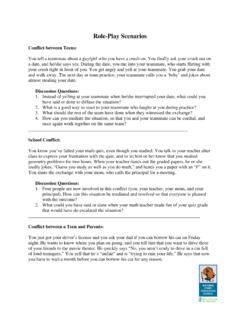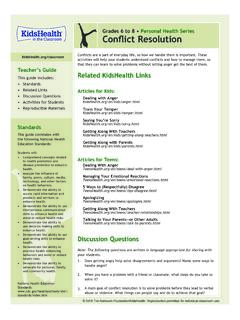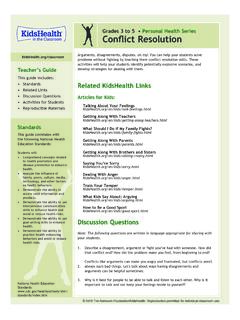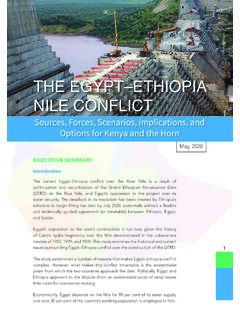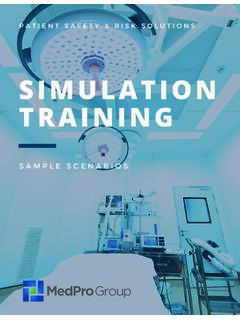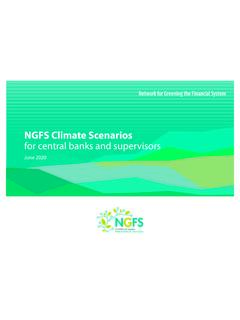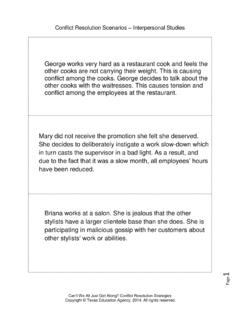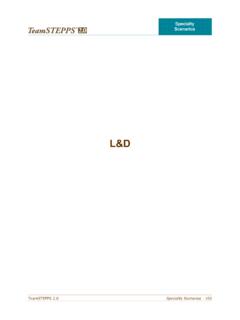Transcription of SAMPLE SCENARIOS AND QUESTIONS - CYCCB
1 Reproduced with permission from the CYC Professional Certification Workbook 2017 Copyright 2017 Child and Youth Care Certification Board, Inc. All Rights Reserved. Page 1 SAMPLE SCENARIOS AND QUESTIONS The following SCENARIOS and QUESTIONS are similar to the ones included on the CYC Certification exams. Some of them were included on the initial version of the exam used during the pilot testing. They offer an opportunity to practice identifying the key principle(s) involved and becoming more familiar with the testing process. QUESTIONS are coded to indicate the competency they are testing and the practice setting they describe. When you read the SCENARIOS , notice how the text describes key ideas that describe the answer. Read the QUESTIONS carefully and don t assume. All the information you need to understand the question is given, either in the scenario or in the question .
2 The exam is formatted with a scenario first followed by one or more QUESTIONS that relate to the scenario. Some SCENARIOS initially describe a situation and are then followed by a question . Additional information may be provided before the second or third question is asked. In these cases, be sure to consider all of the information provided in the scenario before identifying the answer. It is helpful to review not only what the correct answer is, but also why each of the other answers is incorrect. You will notice that the correct answer reflects one or more principles of practice properly applied ( , creating genuine caring relationships, rewards work better than punishment, focus on strengths and competence, etc.). The exam typically doesn t ask about principles directly. Instead, it asks you to apply a principle correctly to arrive at the best answer ( , you have to understand the stages of group development to understand the meaning of the behavioral cues in the scenario, etc.)
3 FOSTER CARE Julie, a fifteen year old, has been late to school many times during the last several weeks. Julie s foster father has noticed that Julie has trouble getting up on time and getting ready to leave the house. When she finally does leave, she often takes longer than the other kids to walk to school. She always gets there, but often late. 1. The foster father has decided that one of the approaches described below will be used to address the issue. Which approach is based on current best practices? a) Julie will not have use of her favorite radio until she has been able to arrive, on time, at school for two weeks. b) Julie will have to get up an hour earlier on school days and leave the house earlier. c) Julie will not be allowed to interact with friends after school until she has been able to arrive, on time, at school for two weeks.
4 D) Julie s foster father will deliver her to school in the car. Reproduced with permission from the CYC Professional Certification Workbook 2017 Copyright 2017 Child and Youth Care Certification Board, Inc. All Rights Reserved. Page 2 RESIDENTIAL CARE A group of pre-teens has been working together for about two months. A number of them have begun to establish connections with each other as they have had the opportunity to get know each other better. In particular, you have noticed that group rules and established roles are beginning to emerge from among the members of the group and that you don t have to rely as much on external rules. One afternoon you are working closely with a subset of the larger group. Each person in this group had a chore they were responsible for. As the others in the group are finishing their chores, you notice that one is behind in completing her task.
5 When you take a closer look you realize she is attempting to complete her responsibility, but lacks the skills to do so. The next activity begins in ten minutes and it appears that she will not be able to finish in time to attend. 2. What stage of development is this group currently experiencing? a) Forming b) Storming c) Norming d) Performing 3. Which immediate response would likely best support the optimal development of the youth in this situation? a) Ask youth to complete a different chore while you complete her original task. b) Join in the chore alongside youth to model how to complete the task and allow her to be late to the activity. c) Swap chores between two youth. d) Let the youth complete the chore on her own without interrupting and then redo the task yourself at a later time. OUT-OF-SCHOOL TIME You are observing an out-of-school time program located in a middle school.
6 A small group of 7-10 year olds and a youth worker are preparing snacks in the afternoon recreation program. Youth are drifting in and out of the activity from outside. When they join the activity, they help by peeling bananas or cutting slices of cheese and salami. Some of the youth are wiping their runny noses on their shirtsleeves as they work. Some are openly coughing on the prepared food. The youth worker continues to prepare snacks without comment. 4. A better response might be: a) Follow a policy that only the youth workers can prepare snacks. b) Only allow youth who have washed their hands to participate, and tell everyone that if they are sick they should not handle food. c) Put up HIV/AIDS awareness posters, and only allow youth who have washed their hands to participate in preparing the snacks. Reproduced with permission from the CYC Professional Certification Workbook 2017 Copyright 2017 Child and Youth Care Certification Board, Inc.
7 All Rights Reserved. Page 3 d) Require a note from a caregiver for any youth that has been sick before allowing them to participate in snack preparation. 5. The best way to prevent illness is to: a) Avoid physical contact with youth that appear sick. b) Mop the floors frequently with disinfectant. c) Isolate children who are ill. d) Wash your hands frequently. OUT-OF-SCHOOL TIME A week later you observe an out-of-school time program for older youth. You and the other youth workers have become increasingly concerned about the disruptive nature of the teasing among the 11 to 12 year olds in this group of children in the program. 6. Which of the following programs would you implement to specifically target this concern? a) A series of 30-minute anti-bullying lessons for the next week with the whole group.
8 B) A 60-minute social skills group with the whole group every second day. c) A peer helping program that teaches the older children conflict resolution skills to use to mediate in the younger group. d) A reading buddy program, linking older and younger children. CAMPING/RECREATION SCENARIO Several days after camp started, one of the youth in your group, Chris, became very upset and left the group during an activity. Another staff member covered your group while you went to find Chris to figure out what was happening. Your experience with Chris has shown you that he behaves more like a 10-12 year old, instead of the 16 year old that he is. You realize as you talk to Chris that he is feeling overwhelmed by the stimulation of group experience and not feeling like he fits in. This has apparently been developing since the beginning of camp.
9 You ask Chris why he didn t say anything about his feelings before the blow up. He doesn t answer. You suggest that it may be hard for him to talk about these feelings in front of the other group members. He nods. You suggest that maybe the two of you can agree on a signal that will let you know when he is beginning to feel overwhelmed so you can arrange for him to take a short break from the group. He nods again but after several prompts he never produces a signal. 7. From what happened and Chris s response to you, you conclude that: a) Chris doesn t want the problem to be solved because he really wants to go home. b) Chris may have a learning disability and is having problems thinking of a signal. Reproduced with permission from the CYC Professional Certification Workbook 2017 Copyright 2017 Child and Youth Care Certification Board, Inc.
10 All Rights Reserved. Page 4 c) Chris is probably diagnosed as oppositional defiant disorder. d) Chris is developmentally disabled and not capable of fitting into the group. It is the last day of camp. This afternoon the group will disband and the youth will return to their communities. 8. The best activity to include as a closing activity is: a) Plenty of time for individual journaling focused on thinking back over the week and what each participant learned about the group during the week. b) Discussions focused on the group s sense of loss and sadness at the completion of the group experience and how these experiences make people stronger. c) Discussions which acknowledge the group members perceptions and feelings about the week long experience and how the experiences might be useful in their lives when they return to their communities.
